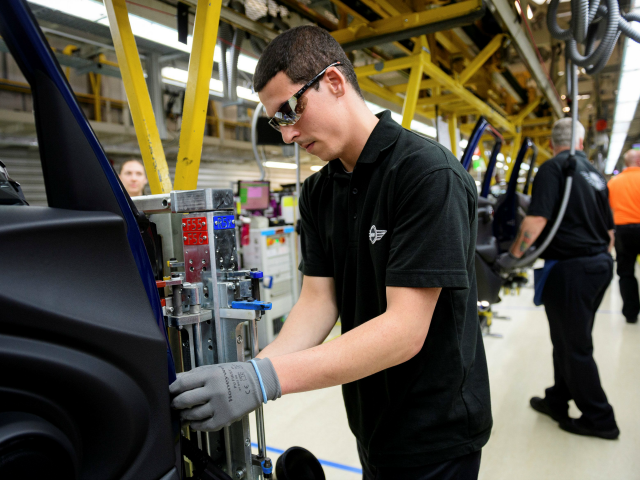(Reuters) – British factories had their strongest month in more than two years in September, a survey showed, raising doubts about whether the central bank and finance ministry will announce more stimulus measures to offset the economic hit of the Brexit vote.
The Markit/CIPS Purchasing Managers’ Index (PMI) showed a surge in export orders, helped by the fall in the value of the pound after June’s referendum vote to leave the European Union.
The manufacturing index reached its highest level since June 2014 in September, rising to 55.4 in September from 53.4 in August as it continued to rebound from a three-year low in July.
Sterling erased some of its earlier losses made when it slumped to a three-year low against the euro following Prime Minister Theresa May’s announcement of a March deadline for starting formal divorce talks with the EU.
September’s factory PMI exceeded all forecasts in a Reuters poll, and suggested third-quarter growth in manufacturing – which accounts for 10 percent of Britain’s economy – will be the strongest so far this year.
Consumer goods producers did best, reflecting continued strong demand from households, while export orders rose at the fastest rate since January 2014.
Demand for investment goods also rose, which Markit said suggested at least a temporary pick-up in businesses’ investment intentions since the start of the year.
Manufacturing group EEF said strong PMI data elsewhere in Europe on Monday suggested stronger demand would last for British exporters.
The flip side of the weak currency is inflation. Price rises slowed slightly from a five-year high in August, but factories’ raw material costs were still rising at double-digit rates, some of which was being passed on to consumers.
Investors are watching for a PMI reading of the bigger services sector on Wednesday for an indication of how quickly the British economy has recovered from the Brexit shock.
“But for the Bank of England, this adds to a raft of strong data which undermine the case for an additional rate cut in November,” Elizabeth Martins, an economist at HSBC, said, referring to Monday’s manufacturing survey.
The signs of resilience in the economy were also noted by Chancellor Philip Hammond who is due to announce his first budget plans on Nov. 23. He said economic data for the first half of 2016 showed the economy was running at “8 out of 10”.
“Some upbeat data of late have removed the urgency for Hammond to throw the kitchen sink at the economy in the Autumn Statement,” Alan Clarke, an economist at Scotiabank, said.
Over the longer term, Brexit represents a big challenge to the British economy as the government tries to keep as much access as possible to EU markets while also heeding the message from voters to take more control over immigration, something that could fall foul of the EU’s freedom of movement principle.
Japanese carmaker Nissan said on Thursday it wanted Britain to compensate it for any tariff barriers if it was to maintain investment plans. On Friday, Jaguar Land Rover said other auto manufacturers would need a level playing field if Nissan received assistance.

COMMENTS
Please let us know if you're having issues with commenting.